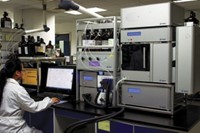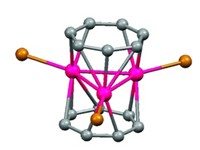Advertisement
Grab your lab coat. Let's get started
Welcome!
Welcome!
Create an account below to get 6 C&EN articles per month, receive newsletters and more - all free.
It seems this is your first time logging in online. Please enter the following information to continue.
As an ACS member you automatically get access to this site. All we need is few more details to create your reading experience.
Not you? Sign in with a different account.
Not you? Sign in with a different account.
ERROR 1
ERROR 1
ERROR 2
ERROR 2
ERROR 2
ERROR 2
ERROR 2
Password and Confirm password must match.
If you have an ACS member number, please enter it here so we can link this account to your membership. (optional)
ERROR 2
ACS values your privacy. By submitting your information, you are gaining access to C&EN and subscribing to our weekly newsletter. We use the information you provide to make your reading experience better, and we will never sell your data to third party members.
Analytical Chemistry
Liquor-Store Spirits Provide Green Alternative To HPLC Solvents
Analytical Chemistry: Rum or vodka combined with household products produces high-quality results when used in high-performance liquid chromatography
by Catherine M. Cooney
April 17, 2015

Long considered a lab workhorse, high-performance liquid chromatography (HPLC) typically requires expensive chemicals that need to be disposed of as hazardous waste. A new study shows that rum, vodka, and other distilled alcohols combined with household products can serve as low-cost and sustainable alternative eluents for HPLC, and in many cases produce excellent analytical results (ACS Sustainable Chem. Eng. 2015, DOI: 10.1021/acssuschemeng.5b00133).
Chemists most often use the solvent acetonitrile in HPLC separations to elute the components of mixtures from the instrument’s chromatographic column. During a worldwide shortage of acetonitrile in 2009, which caused the price to skyrocket, researchers found that ethanol was a good substitute. Still, the cost of HPLC-grade absolute ethanol is high, typically about $120/L.
Recent innovations have reduced the size and cost of HPLC-based instruments, raising the possibility that HPLC could someday be used in doctors’ offices and in labs in developing countries. So Erik L. Regalado, Christopher J. Welch, and colleagues of Merck Research Laboratories, in Rahway, N.J., wanted to see if cheaper and more readily available solvents could perform as well as HPLC-grade ethanol.
The researchers combined distilled spirits purchased from a local liquor store with ammonia and white vinegar from a supermarket and used the eluents to separate a mixture of five compounds—uracil, caffeine, 1-phenylethanol, butylparaben, and anthracene—in a conventional HPLC instrument.
In HPLC, compounds separate based on how quickly they move through the instrument’s column. The team found that grain alcohol, which cost $22/L, was a good substitute for HPLC-grade ethanol, especially when analyzing more hydrophilic compounds that move slowly through the column. Rum and the lower-proof alcohols were less effective at eluting the strongly retained components, but they cleanly separated compounds that came off the column in a shorter time. The liquor-store alcohol-based eluents also performed as well as HPLC-grade ethanol in HPLC combined with mass spectrometry (HPLC/MS) when measuring caffeine and theanine in brewed black teas and vitamin C from oranges and supplement pills.
Similar analyses on a microfluidic HPLC instrument required much less solvent. One high-throughput analysis of vanillin in a vanilla extract showed that a single “airline serving” of vodka was sufficient for 1,560 assays.
“In effect, distilled alcohol spirits are just a more convenient and more economical way to obtain ethanol,” Welch says. The liquors they tested—rum, vodka, cachaça, and aguardiente—contained at most 40% ethanol, while the grain alcohol was 95%.
The researchers admit these analytical results could be performed more quickly and perhaps with finer resolution using acetonitrile, which costs $50 to $130/L. “However, the green chemistry and cost advantages of this method open up some interesting possibilities for the use of HPLC/MS technologies outside the conventional laboratory setting,” Welch says.
Larry Miller, a principal scientist at Amgen and president of the nonprofit Green Chemistry Group, agrees that the nonhazardous substances can perform chromatographic separations that, in many cases, are roughly equivalent to using acetonitrile. “But there are still challenges, including the price and availability of the smaller instruments, that would have to be overcome before HPLC/MS can be routinely used in nontraditional settings,” Miller says.





Join the conversation
Contact the reporter
Submit a Letter to the Editor for publication
Engage with us on Twitter